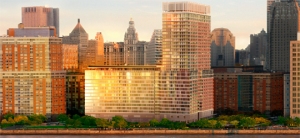Posts filed under ‘Architecture’
You Can Appeal LEED Certification. But Why?
 LEED certifications are not set in stone. In fact, there are appeal process written into to the LEED policy manual. Appeals don’t happen often, but the Northland Pines High School LEED gold certification has been under fire since it was awarded in 2007:
LEED certifications are not set in stone. In fact, there are appeal process written into to the LEED policy manual. Appeals don’t happen often, but the Northland Pines High School LEED gold certification has been under fire since it was awarded in 2007:
“The residents initially raised concerns about the project during the design phase, claiming that a more efficient HVAC system was available and should have been specified by Hoffman LLC, the Appleton, Wisconsin-based firm that designed the school.” – Green Real Estate Law Journal
A successful appeal will likely replace Northland Pines’ gold certification with silver. But why are people concerned? Is there a vendetta against LEED, Hoffman LLC, or the school? Of course there needs to be a system of checks and balances to make sure that LEED awards or denies certification in accordance with their own rules to maintain the legitimacy and distinction of LEED itself. But if maintaining a watchful eye over LEED is the primary motive for the appeals process, then this initiative is misguided.
 A local high school with LEED gold certification can draw positive attention to a community and its members. Northland Pines would be recognized for its environmental initiative and may become more prestigious as a result, probably two reasons the school’s board agreed to spend extra money for LEED certification in the first place. However, appealing the LEED gold certification highlights a possible “failure”, in effect overshadowing what could have been regarded a community accomplishment.
A local high school with LEED gold certification can draw positive attention to a community and its members. Northland Pines would be recognized for its environmental initiative and may become more prestigious as a result, probably two reasons the school’s board agreed to spend extra money for LEED certification in the first place. However, appealing the LEED gold certification highlights a possible “failure”, in effect overshadowing what could have been regarded a community accomplishment.
We would rather see more new construction projects try to achieve LEED status and fail, then make no attempt at all. If the Northland Pines appeal fails, congratulations on gold certification. If it succeeds, congratulations on silver which is still fantastic accomplishment.
On the other hand, LEED appeals present new business opportunities for LEED certified lawyers. As the number of green buildings continue to increase, we can be sure that there will be increasing demand for LEED lawyers, “LEEDigation” and certified architects and contractors.
Under what circumstances would you appeal a LEED certification?
Act To Eliminate Fossil Fuels In New Buildings By 2010
The American Institute of Architects (AIA) have issued a commitment to eliminate the use of fossil fuels in new buildings by 2030. The “2030 Challenge” as it is called, is backed by a new reporting tool developed by the AIA that will allow architects to submit their energy models, estimate square footage and building energy use data, and then compare these estimates to the 2030 goals.
 The 2030 Challenge has over 100 members. Some architects, however, are hesitant to participate citing concerns about project and design privacy. Others think the model is oversimplified and should be more sophisticated in grading and evaluation criteria. Creators of the challenge and its reporting tools say the framework is intentionally open so as not to limit participation.
The 2030 Challenge has over 100 members. Some architects, however, are hesitant to participate citing concerns about project and design privacy. Others think the model is oversimplified and should be more sophisticated in grading and evaluation criteria. Creators of the challenge and its reporting tools say the framework is intentionally open so as not to limit participation.
With further improvement to the challenge concept we might see a push to make the initiative extend beyond just willing AIA members. By 2030 we could see new technology help the challenge cause, watch the initiative burn out, or realize that the goals of the challenge are too ambitious. We are all supportive of the 2030 challenge, but I’m sure many of us are also skeptical of its chances for success.
Original article here: http://bit.ly/bXCfJr
Large LEED Construction Causing Costly Law Suits and Legal Pressures
People will pay more to live in LEED certified buildings. LEED construction projects often cost more, but they are also cost saving investments and are becoming somewhat trendy. However, for large-scale projects such as Battery Park City’s Riverhouse, the potential costs of falling short of the LEED requirements can lead to an array of problems. 
Riverhouse’s heating and cooling systems are supposed cutting-edge, energy efficient, green designs. Unfortunately, the builders just can’t get them to work quite right. One tenant has already sued the building about the issue. We take heating and cooling systems for granted but judging from the Riverhouse construction project, these components become more difficult when required to meet LEED standards.
No one can doubt the benefits or importance of green construction both for our wallets and the environment, but situations similar to Riverhouse are not uncommon and serve to stress the importance of taking the time to carefully plan the LEED certified project before breaking ground.
I give the developers the benefit of the doubt and assume that they did their due diligence to double check with the engineers about the effectiveness of the heating system. But if one tenant is looking to recover $1.5million associated with the heating defects, imagine the costs that could stem from the entire residency filing suit. The building is still unfinished, but is estimated to already be 75% sold out.
Find the complete story and posting here. http://bit.ly/awCgRg
Thanks to gbnyc for the blog topic